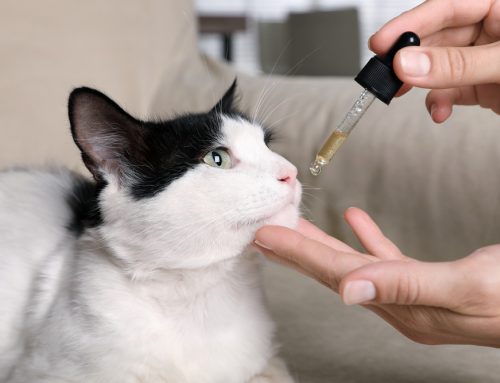Occasional chewing, itching, and scratching are normal in pets, but if your four-legged friend is incessantly exhibiting these behaviors, they may be suffering from pruritus (i.e., itching) and an underlying medical condition for which they should receive treatment. If your pet is always scratching, you may feel concerned knowing they feel miserable, but also because identifying the true cause of their itchiness can be challenging. Many issues can trigger cats’ and dogs’ itchiness, and depending on the condition’s cause, our veterinary team may have to try numerous treatments before pinpointing the source of your pet’s itchiness. Learn how to help your pet get relief by reading our Walnut Creek Vet Hospital team’s response to itchiness myths.
Myth #1: An itchy pet is nothing to worry about
Every pet is itchy at times, but you should monitor your four-legged friend if they are scratching incessantly, because they likely need veterinary treatment for lingering signs. Itchiness signs include:
- Licking an area excessively
- Chewing or biting the skin
- Rubbing against the carpet, wall, or floor
- Scooting their hind end on the floor
- Head shaking
Pruritus is not a diagnosis, but rather a sign that can indicate various ailments such as infections, allergies, parasites, and disease. Determining the cause of your pet’s itch is essential to providing them relief and protecting their health.
Myth #2: Fleas are no big deal for pets
When a flea bites your pet, the bug injects its saliva into your furry pal’s skin. Some pets are hypersensitive to a protein in flea saliva and can develop flea allergy dermatitis (FAD), which causes a severe reaction. FAD signs include:
- Intense scratching
- Hair loss, especially on their hind end and tail base
- Red, irritated skin
Because fleas are tiny and can reproduce quickly, you may not notice them on your pet until your four-legged friend shows obvious discomfort signs. If you suspect your pet has fleas, your veterinarian will use a fine-tooth comb to find the pests or flea dirt (i.e. flea excrement) in your pet’s fur. Our Walnut Creek Vet Hospital team can recommend a flea control plan based on your pet’s needs
Myth #3: Itchy skin has nothing to do with pet allergies

When your allergies flare, you likely sneeze, become congested, and have itchy, watery eyes. However, your pet’s allergy signs are more likely to manifest as a skin condition. While some allergic pets may sneeze and have eye drainage, upper respiratory signs are much less common than skin issues, which include extreme itchiness. If your pet has allergies, they may exhibit any combination of the following signs:
- Red, inflamed, irritated skin
- Licking at the paws
- Rubbing at the face
- Scratching
- Small red bumps on the skin
- Chronic ear infections
- Scooting along the floor
- Skin infections and hot spots
- Gastrointestinal (GI) problems
Any pet can suffer from allergies, but certain breeds, including golden retrievers, poodles, shih tzus, cocker spaniels, and bulldogs, are genetically predisposed to the allergy-related skin condition atopic dermatitis (AD).
Myth #4: Pet allergies are seasonal
Environmental allergens, such as pollen, grass, weeds, molds, and fungi, can affect pets seasonally or year-round. Pets with year-round allergies can experience seasons during which their symptoms worsen. In other words, a pet may exhibit extreme allergy signs during one season, but also have milder allergies during other seasons. Sometimes, a pet’s seasonal allergies progress to nonseasonal, becoming year-round. More than one allergen can affect your pet, and their allergens may change or worsen over time.
Myth #5: Pet food allergies are common
While a food allergy can cause itching, a true food allergy is uncommon and is often confused with food sensitivity. A food allergy occurs when the immune system responds to an allergen—most often beef, chicken, dairy products, or wheat—to which your pet has previously been exposed. A pet with a food sensitivity cannot properly digest a particular food and usually shows signs within an hour of eating the offending ingredient. If your pet has a food allergy, their signs can vary and may include:
- Itching
- Hair loss
- Ear infections
- Vomiting
- Diarrhea
- Appetite loss
If our veterinarian suspects your pet has a food allergy, we will likely recommend a dietary elimination trial to determine the offending ingredient. They can then recommend a nutritious diet that does not include the triggering protein.
Myth #6: Only outdoor pets have a parasitic disease risk
Some of the itchiest skin parasites are Sarcoptes mites, which cause intense, deep itching. While pets who go outside are more commonly exposed to mites through contact with other animals or the environment, indoor pets can also be affected. Mites can be brought into the home on your clothing or on a pet’s fur or bedding. Once inside, mites can spread to all household pets and family members. Along with itching, hair loss is common for a pet with mites—typically on the legs and belly—and the skin may thicken if the condition is not treated. Secondary skin infections can also occur.
If we suspect your pet has mites, our veterinary team will perform a skin scrape and assess the microscopic detritus. Many different topical and oral medications are available to treat mange. However, year-round, monthly prescription parasite control is your pet’s best defense against infection.
Itching can be extremely uncomfortable for pets and can lead to serious health issues if left untreated. If your pet has been biting, licking, or scratching, schedule an appointment with our Walnut Creek Vet Hospital team, so we can identify and treat your furry pal’s condition.









Leave A Comment